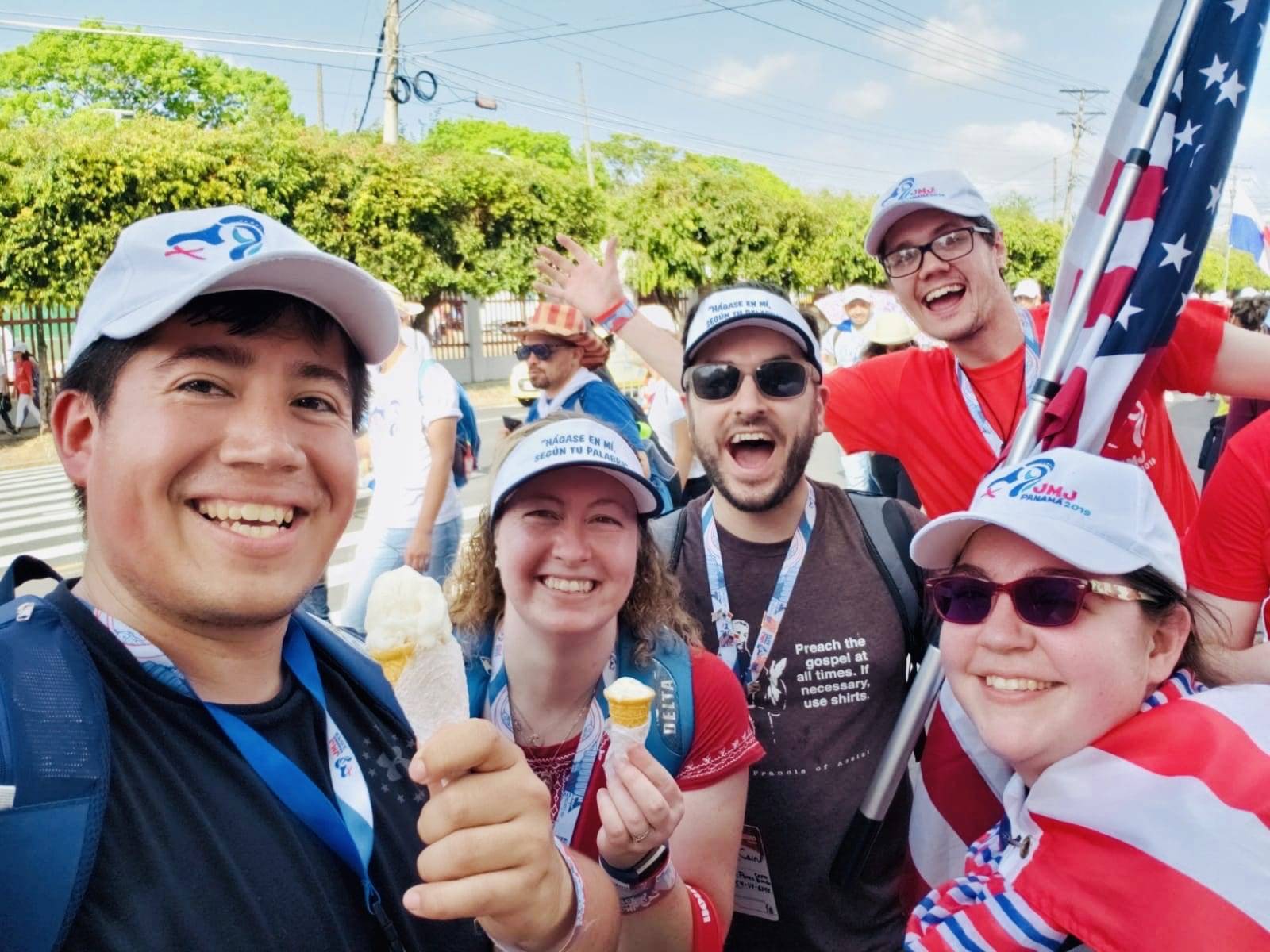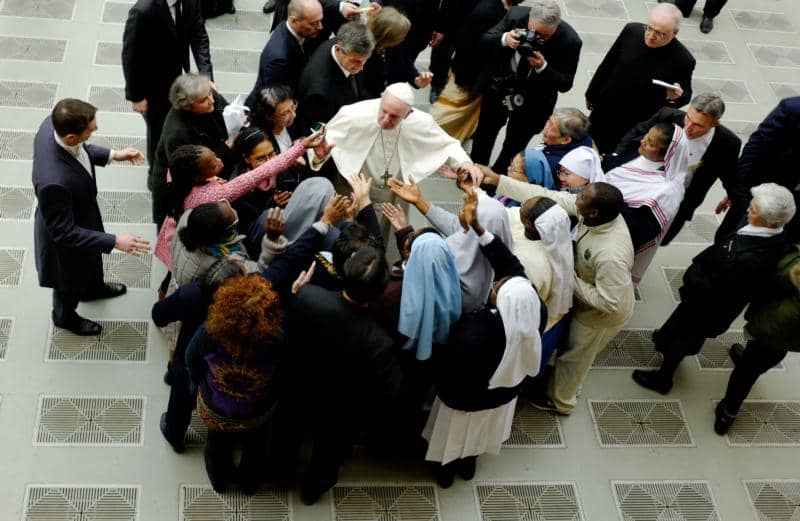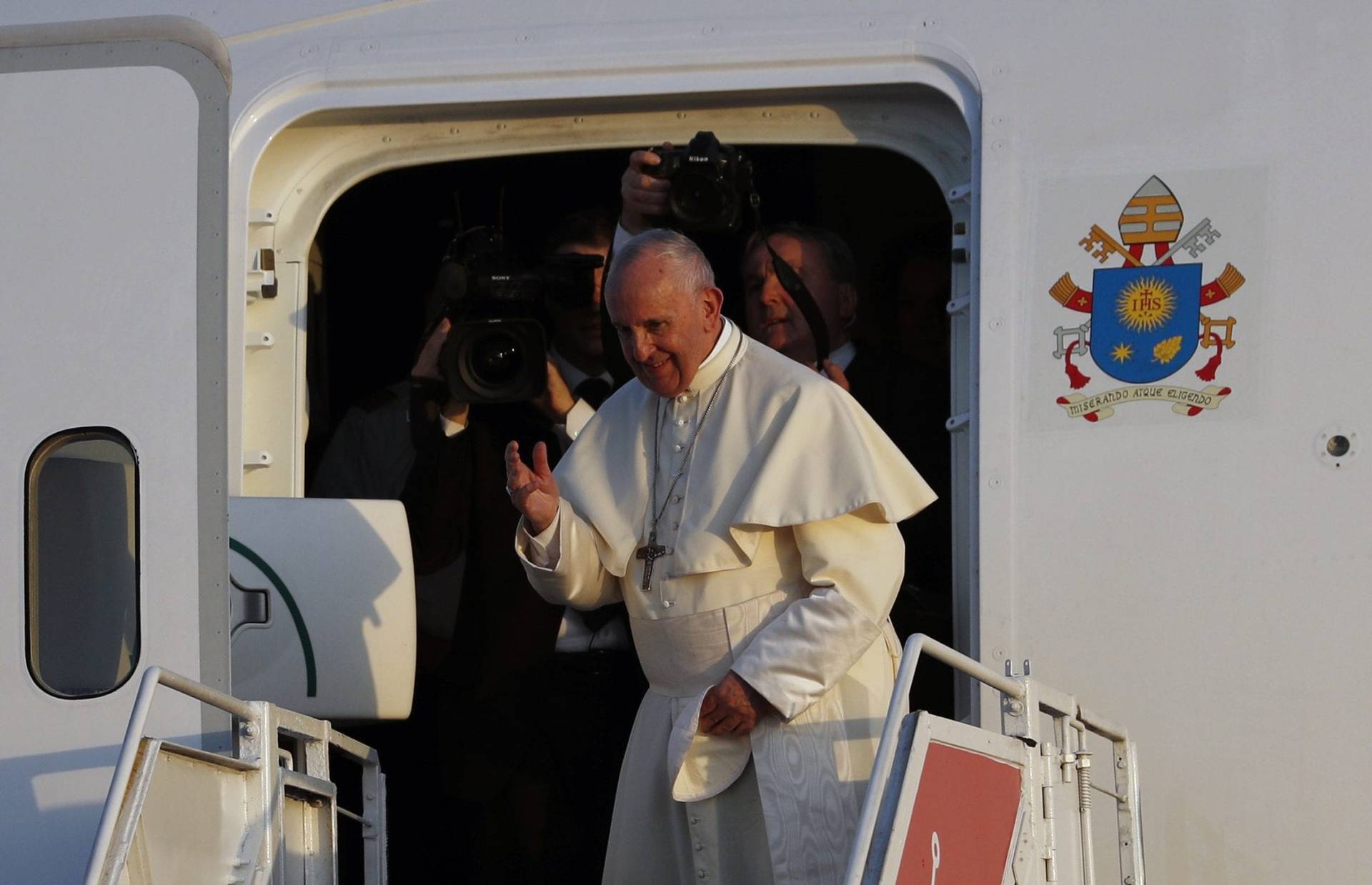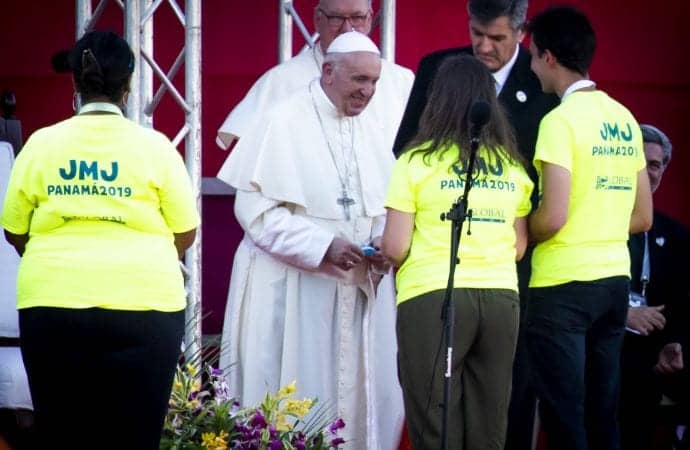PANAMA CITY – Speaking to over half a million young people from around the world on Sunday, Pope Francis said Jesus is not “an interval in life nor a passing fad,” but a loving God who’s concrete and close.
Jesus, the pontiff said, is “festive joy,” born from taking part in the “miraculous draught of hope and charity, solidarity and fraternity, despite the paralyzed and paralyzing gaze born of fear and exclusion, speculation and manipulation.”
Jesus, Francis added, is not a “meantime,” but the “generous love that invites us to entrust ourselves.”
The pope’s remarks came during the closing Mass of World Youth Day, which took place in the John Paul II field, some 15 miles from downtown Panama City. Most of those attending had arrived Saturday afternoon to participate in a prayer vigil which, together with the Mass, constitutes the closing events of this week-long itinerant Vatican-sponsored festival often defined as the “Catholic Woodstock.”
To avoid heat stroke among those who spent the night out in the field, and who will have to walk back to the city once the Mass is over, the celebration began at 8:00 a.m. local, though warm-up presentations, designed to wake the young people up with enough time so they could have breakfast before Mass, began right at 6:00 a.m.
Despite obvious exhaustion, the youth seemed visibly joyous and glad to be on hand. Coming from 155 countries, most attended the week’s events with friends, schoolmates or parish communities.
As is usually the case at the end of WYD, one of the expressions heard most often among the young people was that it was “unforgettable,” a “once in a lifetime thing,” because most doubt they’d be able to go through it again. Eventually, however, many do.
Ahead of the pope’s arrival, Crux spoke with several pilgrims, most from Latin America, and all from countries that want to see the pope refer to their own situation, either due to political turmoil or because of crisis within the Church.
For instance, Siori, 22, requested her last name be kept out because she comes from Venezuela, and is afraid of facing reprisals when she heads back tomorrow. She began saving money to participate since Panama was announced as the hosting city in 2016.
“Up until the last moment, I wasn’t sure I’d be able to come,” she said. Yet her brother, who fled Venezuela three years ago and currently lives in the United Kingdom, helped her cover the cost of the plane ticket. Seeing the current crisis in her country, Siori hopes Francis will say something to the people of Venezuela.
“I don’t know what I want him to say, other than that he’s praying for us. We could really use his prayers.”
Martin Alvarado, from Guatemala, came with his group of some 60 pilgrims at dawn on Saturday to claim first-row seats in a field that opened six hours after his arrival.
“We want for the pope to see our flags,” he said. “We could really use a papal visit in Guatemala.”
Laura Martinez, a young pilgrim from Chile, said her group had debated about whether to attend WYD: The crisis in the local church, with eight bishops under investigation for covering up clerical sexual abuse, is only the tip of the iceberg.
“But, at the end of the day, we are the Church,” she said. “Us, pilgrims, the laity. It’s not only the bishops, or the priests. It’s all of us. And they robbed us of a lot of things. We decided that we wouldn’t allow them to rob us our faith, our sense of community.”
She acknowledged that a year ago, when Francis was in Chile, she didn’t attend any papal events: “I was hurt, I was disappointed. But he’s apologized to us, he’s helping us move on, and he’s the pope, the Vicar of Christ. There must be a good reason for that!”
Also likely to be tired given their average age, the some 480 bishops who participated in the closing Mass had their pick-up call at 4:15 a.m.
Several presidents of Central America, and the president of Portugal, were on hand. Though the announcement won’t come until the end of the Mass, it’s been widely rumored that Portugal will host the next edition. The speculation has been stoked by the presence of not only President Marcelo Rebelo de Sousa but also the image of Our Lady of Fatima, which hadn’t left Portugal since 2000.
During his homily, Francis warned young people against believing that God is anything other than “concrete and commonplace,” because he’s “close and real,” and present, working through “somebody like a neighbor, a friend, a relative.”
“We do not always believe that the Lord can invite us to work and soil our hands with him in his Kingdom in that simple and blunt a way,” he said.
Francis then quoted his predecessor, Pope emeritus Benedict XVI: “It is hard to accept that ‘God’s love can become concrete and can almost be experienced in history with all its painful and glorious vicissitudes’.”
In a sense Benedict was present throughout the entire week, always eliciting loud cheers when Francis mentioned him. When he did so on Thursday, during the opening ceremony, the pontiff said that his predecessor was “watching us on TV” and urged the hundreds of thousands who had gathered to send their greetings to the German pontiff, which they readily did.
Often, Francis said, “we prefer a distant God: nice, good, generous but far-off, a God who does not inconvenience us. Because a close and everyday God, a friend and brother, demands that we be concerned with our surroundings, everyday affairs and above all fraternity. God chose not to reveal himself as an angel or in some spectacular way, but to give us a face that is fraternal and friendly, concrete and familiar.”
“God is real because love is real; God is concrete because love is concrete,” he said. “Indeed, this concrete manifestation of love is one of the essential elements in the life of Christians.”
Young people, he said, can experience this lack of concreteness when they think that their mission is a “promise far off in the future,” as if it had nothing to do with the present, with youth being instead a “waiting room” for life.
“And in the ‘meantime’, we adults, or you yourselves, invent a hygienically sealed future, without consequences, where everything is safe, secure and ‘well insured’,” he said. Older generations “tranquilize” young people, numbing them into keeping quiet, letting their dreams go stale, “flat … petty and plaintive.”
That’s “only because we think, or you think, that your ‘now’ has not yet come, that you are too young to be involved in dreaming about and working for the future,” Francis said. However, he said, young people “aren’t the future but the ‘now’ of God, who calls on them to go out and find their elders, to speak with them and realize the dream that the Lord has dreamed for you.”
After the Mass, the pope was scheduled to visit a home for the handicapped and patients with HIV/AIDS before flying back to Rome in the afternoon.













